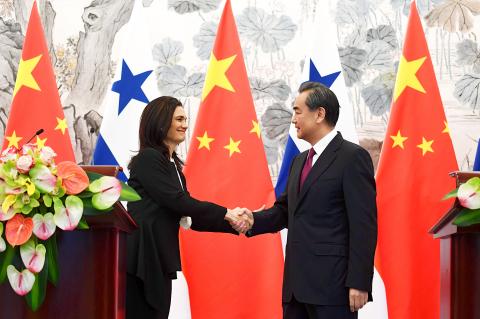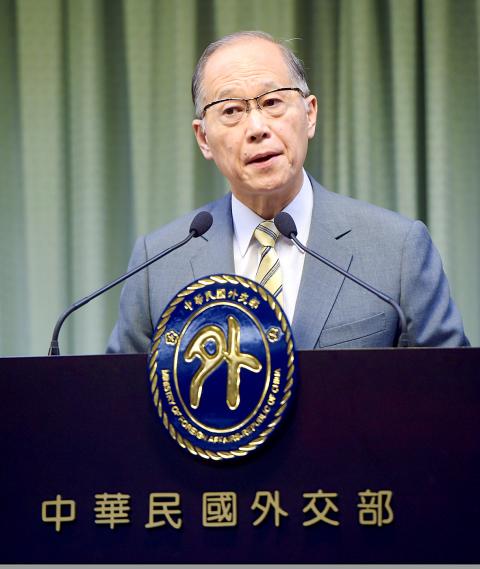Taiwan is cutting diplomatic ties with Panama after the Central American country switched diplomatic recognition from Taipei to Beijing, Minister of Foreign Affairs David Lee (李大維) announced yesterday.
“To safeguard our nation’s sovereignty and dignity, we have decided to terminate diplomatic ties with Panama immediately,” Lee said at a news conference, in which he also expressed Taiwan’s “deep anger and regret” about Panama’s decision.
Taiwan is also to halt all bilateral cooperative projects, cut all assistance to Panama, and pull out its diplomatic staff and technical missions from the country, Lee said.

Photo: AFP
Even though the two nations had maintained diplomatic ties for more than a century, Panamanian President Juan Carlos Varela caved in to Beijing for “economic interests” and ignored Taiwan’s long-term assistance that supported its overall development, Lee said.
Lee described Panama’s diplomatic switch as “most unfriendly” and accused Panama of “deceiving the Republic of China government until the last moment.”
He said that Taipei felt a sense of “strong dissatisfaction and anger” about the move, but reaffirmed that Taipei would not engage in a contest of “checkbook diplomacy” with Beijing.

Photo: Huang Yao-cheng, Taipei Times
Taiwan also “strongly protests and condemns Beijing for luring Panama to switch diplomatic ties, squeezing Taiwan’s space in the international community and hurting Taiwanese feelings,” he said.
Taiwan’s response came after Varela announced that Panama was establishing diplomatic ties with China, saying in a televised address that it represents the “correct path for our country.”
At the Diaoyutai State Guesthouse in Beijing yesterday, Chinese Minister of Foreign Affairs Wang Yi (王毅) and Panamanian Minister of Foreign Affairs Isabel de Saint Malo signed a joint communique establishing diplomatic relations, followed by a champagne toast.
Wang said he was sure relations between the two countries would have a “bright future.”
De Saint Malo said she hoped the new relationship would lead to trade, investment and tourism opportunities, in particular “exporting more goods from Panama to China.”
In the joint communique, Panama said it would not maintain any official ties with Taiwan and also agreed to recognize that there is only “one China” and that Taiwan is part of it.
Panama’s decision leaves Taiwan with 20 diplomatic allies, 11 of which are in Latin America and the Caribbean.
The decision is widely seen as a result of China’s mounting efforts to apply pressure on Taiwan since President Tsai Ing-wen (蔡英文) took office on May 20 last year.
Lee criticized Panama for keeping Taiwan in the dark about the move, but said there had been signs of Panama’s intentions and Taiwan used every means at its disposal to keep the Central American nation from moving in that direction, without going into specific details.
One of the signs was that Panama did not announce a successor after then-Panamanian ambassador to Taiwan Alfredo Martiz Fuentes on April 30 left his post to take over as Panama’s social security chief, even though Martiz told Tsai on April 20 that bilateral relations were solid.
In addition, Ambassador to Panama Miguel Tsao (曹立傑) has not been able to present his credentials since arriving in the country in the middle of last month.
The diplomatic rift came nearly one year after Tsai visited Panama in June last year on her first state visit.
Tsai attended the inaugural ceremony of the expanded Panama Canal and witnessed Taiwan’s donation of 3,000 boxes of flu medicine to help combat an epidemic of the H1N1 flu virus.
Ties between the Republic of China (ROC) and Panama date back more than a century, to when China's Qing Dynasty established diplomatic relations with Panama on Jan. 16, 1910. The ROC continued the relationship after its founding in January 1912.
Panama is the second diplomatic ally to cut ties since Tsai took office, the first being Sao Tome and Principe, which recognized Beijing in December last year.
In March last year, China re-established official ties with the Gambia, more than two years after the small African nation cut off relations with Taiwan.
Panama has actively sought to set up ties with China in the past.
According to a US Department of State diplomatic message released by WikiLeaks, Panama tried to establish relations with Beijing in 2009 without success.
Additional reporting by AP
This story has been amended since it was first published to correct the date of the establishment of diplomatic relations with Panama.

MAKING WAVES: China’s maritime militia could become a nontraditional threat in war, clogging up shipping lanes to prevent US or Japanese intervention, a report said About 1,900 Chinese ships flying flags of convenience and fishing vessels that participated in China’s military exercises around Taiwan last month and in January have been listed for monitoring, Coast Guard Administration (CGA) Deputy Director-General Hsieh Ching-chin (謝慶欽) said yesterday. Following amendments to the Commercial Port Act (商港法) and the Law of Ships (船舶法) last month, the CGA can designate possible berthing areas or deny ports of call for vessels suspected of loitering around areas where undersea cables can be accessed, Oceans Affairs Council Minister Kuan Bi-ling (管碧玲) said. The list of suspected ships, originally 300, had risen to about 1,900 as

Right-wing political scientist Laura Fernandez on Sunday won Costa Rica’s presidential election by a landslide, after promising to crack down on rising violence linked to the cocaine trade. Fernandez’s nearest rival, economist Alvaro Ramos, conceded defeat as results showed the ruling party far exceeding the threshold of 40 percent needed to avoid a runoff. With 94 percent of polling stations counted, the political heir of outgoing Costa Rican President Rodrigo Chaves had captured 48.3 percent of the vote compared with Ramos’ 33.4 percent, the Supreme Electoral Tribunal said. As soon as the first results were announced, members of Fernandez’s Sovereign People’s Party

MORE RESPONSIBILITY: Draftees would be expected to fight alongside professional soldiers, likely requiring the transformation of some training brigades into combat units The armed forces are to start incorporating new conscripts into combined arms brigades this year to enhance combat readiness, the Executive Yuan’s latest policy report said. The new policy would affect Taiwanese men entering the military for their compulsory service, which was extended to one year under reforms by then-president Tsai Ing-wen (蔡英文) in 2022. The conscripts would be trained to operate machine guns, uncrewed aerial vehicles, anti-tank guided missile launchers and Stinger air defense systems, the report said, adding that the basic training would be lengthened to eight weeks. After basic training, conscripts would be sorted into infantry battalions that would take

GROWING AMBITIONS: The scale and tempo of the operations show that the Strait has become the core theater for China to expand its security interests, the report said Chinese military aircraft incursions around Taiwan have surged nearly 15-fold over the past five years, according to a report released yesterday by the Democratic Progressive Party’s (DPP) Department of China Affairs. Sorties in the Taiwan Strait were previously irregular, totaling 380 in 2020, but have since evolved into routine operations, the report showed. “This demonstrates that the Taiwan Strait has become both the starting point and testing ground for Beijing’s expansionist ambitions,” it said. Driven by military expansionism, China is systematically pursuing actions aimed at altering the regional “status quo,” the department said, adding that Taiwan represents the most critical link in China’s